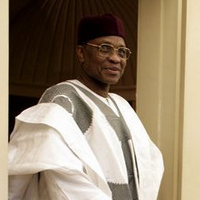Following a trend that has become depressingly familiar in West Africa over the past 18 months, army officers seized power in Niger on Feb. 18, removing President Mamadou Tandja from office. The coup ends a political crisis that began last year, when Tandja used a popular referendum to try to indefinitely prolong his term beyond its December 2009 limit.
Despite the immediate condemnation of the coup by various international bodies, including the African Union and the United States, there was a sense that Tandja got what he deserved. His machinations last year to ram through legislation that not only prolonged his presidency but also granted him unprecedented executive powers were greeted with near-universal criticism, and risked the substantial foreign assistance that the impoverished northwest African state depends on.
The transition from rule by the 71-year-old Tandja to the new military junta was relatively seamless. Tanks rolled into the presidential palace in the capital, Niamey, early in the morning on Feb. 18, beginning a gun battle that lasted for several hours. Unconfirmed media reports declared that between 10 and 30 soldiers, most of them members of the presidential guard, were killed. There were no civilian casualties.

